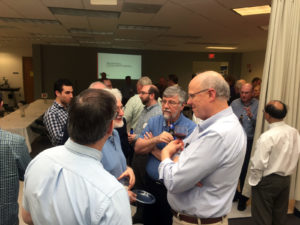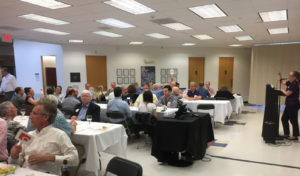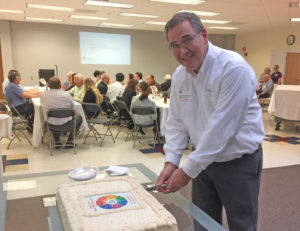This year’s NES/OSA event at Optikos, held May 17th, took its cue from World Metrology Day. As a departure from a single invited speaker, this year’s meeting featured a series of short talks by Optikos engineers that addressed a diverse set of optical metrology topics and supported the original aim of the Metre Convention on the worldwide uniformity of measurement. The metrology brainpower in the room was also measured with a series of questions about the field and prizes awarded for the winning answers!
Speaker Topics Included:
A Beginner’s Guide to MTF Measurements, Hillary Balonek
In any metrology field, it’s easy to get an answer, but it’s far more challenging to get a correct and meaningful answer. Measuring MTF is no exception, and there are many factors that need to be considered to ensure that the MTF data is useful in solving a problem or answering a question about lens image quality and characteristics. In this discussion, we’ll stay away from the complicated math and Fourier analysis, and focus on the practical considerations that go into MTF lens measurements.
Rethinking Head Mounted Display Specifications, Brett Sternfield
The AR/VR resurgence has thrust head-mounted displays (HMD’s) back into the spotlight, however, current consumer HMD optical specifications are limited to field of view and display resolution. Both parameters are poorly defined and do not inform the consumer about the visual quality and feeling of immersion that a headset provides. Instead, we propose a revised list of specifications and measurement methods that are more technically accurate, more relevant to the consumer’s VR/AR experience, and more easily understood.
Lens Shades, Apertures and Stray Light, Peter Clark
Inspired by Irving Abel, we’ll discuss how the extremely effective stray light suppression achieved by coronagraph systems relates to the photographer’s ordinary lens shade, and how an engineer may become confused by terminology. Then, relating to the coronagraph, we will show how a very simple expression can estimate the diffracted stray light from an arbitrarily shaped aperture, which is interesting and may even be a useful thing to know!
Jim Baker’s Distortion Measurement Apparatus, David Imrie
During the Cold War, aerial reconnaissance film cameras were at the forefront of optical engineering. Lens designs had to meet extraordinary performance goals, but without the modern day conveniences of precision motorized stages, CCDs, and Excel spreadsheets, devising instrumentation to characterize these remarkable lenses was no less challenging than their actual design. We reach into the Optikos Museum for an appreciation of a distortion metrology fixture devised by the legendary Jim Baker over 50 years ago.




